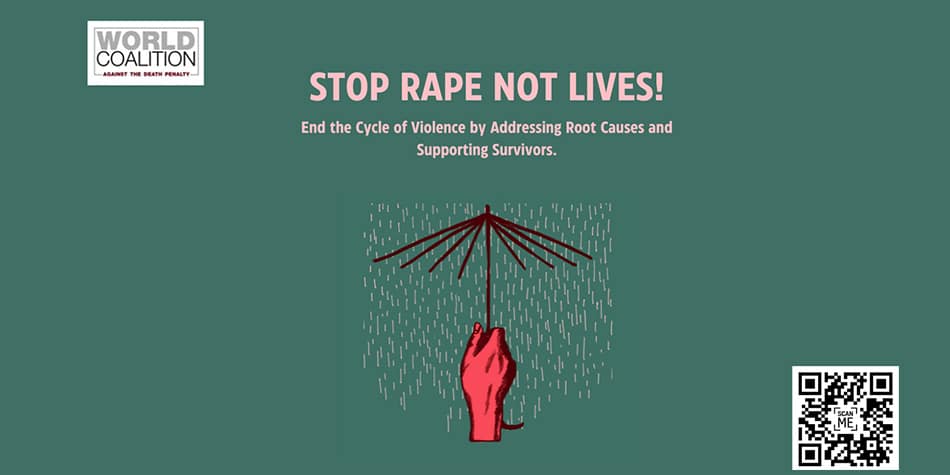Why is the death penalty not the answer to rape?

Every year on October 10, the World Coalition Against the Death Penalty and its members observe World Day Against the Death Penalty. In 2024 and 2025, the abolitionist movement will focus on challenging the widespread misconception that the death penalty increases the safety of individuals and communities.
With this in mind, in this article we will explore why the death penalty is not a viable solution to combat the crime of rape.
Around the world, the death penalty is used as a practical means of creating the illusion that women can be protected from lethal violence by executing the people who kill women.1 and was justified by the patriarchal idea that rape was a “fate worse than death.”2. This belief stems from ancient rape laws that viewed rape as a property crime against men, rather than an act of violence against women. The underlying logic is that a woman who is raped will be “destroyed.”3 and therefore the crime of rape, which involves “taking the life of a woman,” should be punishable by death.
Thirty-one countries worldwide impose the death penalty for rape on the grounds that the death penalty is essential to “protect” women.4In South Asia, widespread outrage over sexual violence has led governments to introduce the death penalty and other harsh punishments for convicted rapists under the guise of deterrence and justice.5In 2020, for example, in India, the Nirbhaya case6 led to discussions about the possible execution of the five convicts, with Prime Minister Narendra Modi stressing the “utmost importance” of preserving the “dignity and safety of women”.
However, none of the states implementing such laws have provided data demonstrating the effectiveness and deterrent effect of the death penalty in rape cases.7On the contrary, a report by Eleos Justice, Monash University, Anti Death Penalty Asia Network (ADPAN) and the SAME Network entitled A deadly distraction: Why the death penalty is not the answer to rape in South Asiashows that most rape victims are attacked by people they know. Such laws could deter victims from reporting the crime, especially if it could lead to the execution of a family member. Consequently, the death penalty for rape risks further reducing the already low reporting rate of this crime.8th. In addition, studies show that jurisdictions that have abolished the death penalty often have lower crime rates than jurisdictions that retain it9which suggests that the death penalty is not an effective means of crime prevention10Rather, it diverts resources from more effective measures that address the root causes of crime.11Indeed, the imposition and execution of the death penalty for rapists diverts attention from the real causes of sexual violence, including systematic gender biases that perpetuate violence against women.12 and identifying solutions.
In addition, many feminist and women’s rights organizations argue that executing rapists is far from what victims and survivors of sexual violence need. Experts such as Mickell Branham and Maiko Tagusari point out that victims often need support and recovery, not harsh punishment of the perpetrator.13A study by Equality Now and Dignity Alliance International (DAI)14 in 2021 found that rape victims prefer justice that includes speedy trials, safe convictions, sensitivity, accountability and societal change over the death penalty. They seek to regain their dignity and honour in a society that stigmatises and further victimises them15This is consistent with what Corey Rayburn highlighted, namely that the death penalty in the Western legal system is often imposed by male legislators who do not fully understand the realities faced by rape victims.16 and therefore do not understand their needs.
We urgently need to consider victim-centered approaches to combat the death penalty for rape. These alternatives include improving legal protections for victims, ensuring access to victim advocates, improving the integrity of the criminal justice system, and educating the public about sexual violence and training the judiciary.17Recognizing that criminal trials do not always produce the desired outcome for victims or their families is a critical step towards abolishing the death penalty and moving away from sole reliance on the criminal justice system, including the death penalty, to deliver justice.



